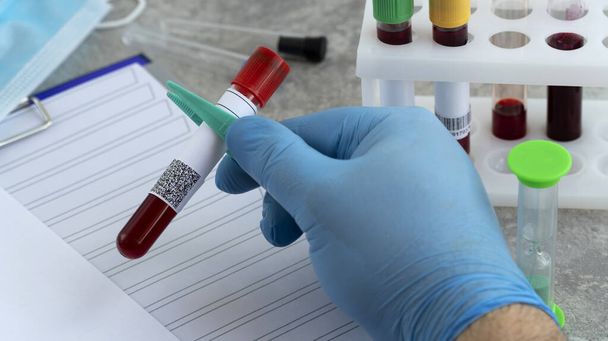In recent years, healthcare has evolved to provide more convenience and accessibility to patients. One such innovation is Home Blood Collection, which offers numerous benefits to individuals who require regular blood tests or those who find it challenging to visit medical facilities. This guide will take you through the process, benefits, and considerations of home blood collection services in Guwahati, helping you understand how it can be a game-changer in managing your health.
What is Home Blood Collection?
Home blood collection is a service where trained healthcare professionals visit your home to collect blood samples for various medical tests. This service is especially beneficial for the elderly, individuals with mobility issues, busy professionals, and those who prefer the comfort and privacy of their homes. The collected samples are then transported to a laboratory for analysis, and the results are shared with the patient and their healthcare provider.
Benefits of Home Blood Collection
- Convenience: One of the most significant advantages of home blood collection is the convenience it offers. You can schedule the appointment at a time that suits you best, eliminating the need to travel to a medical facility.
- Comfort: The comfort of having blood drawn in your own home cannot be overstated. It reduces anxiety and stress, particularly for those who have a fear of medical environments.
- Time-Saving: Home blood collection saves you time that would otherwise be spent traveling and waiting in clinics or hospitals. This is particularly beneficial for busy professionals and parents.
- Safety: During times of infectious disease outbreaks, such as the COVID-19 pandemic, home blood collection minimizes exposure to crowded places, thereby reducing the risk of contracting infections.
- Personalized Care: The service often provides a more personalized experience, with healthcare professionals dedicating their time to address your specific needs and concerns.
Step-by-Step Guide to Home Blood Collection in Guwahati
If you’re considering using home blood collection services, here’s a step-by-step guide to help you understand the process:
Step 1: Scheduling an Appointment
The first step is to schedule an appointment with a home blood collection service provider. Many healthcare facilities and diagnostic centers in Guwahati offer this service. You can book an appointment through their websites, mobile apps, or by calling their customer service. It’s essential to provide accurate details, including your preferred date and time, contact information, and any specific instructions for the visit.
Step 2: Preparing for the Collection
Once your appointment is confirmed, you’ll receive instructions on how to prepare for the blood collection. This may include:
- Fasting: For certain blood tests, such as fasting blood sugar or lipid profile, you may be required to fast for a specific period (usually 8-12 hours) before the sample is collected.
- Medication: Inform the healthcare provider about any medications you are taking, as some may need to be paused before the test.
- Hydration: Drink plenty of water before the blood draw to make the veins more accessible.
- Rest: Get a good night’s sleep before the collection to ensure accurate test results.
Step 3: The Healthcare Professional’s Visit
On the day of the appointment, a trained healthcare professional will arrive at your home at the scheduled time. They will carry all the necessary equipment for the blood draw, including sterile needles, syringes, collection tubes, and disinfectants.
Step 4: Verification and Preparation
The healthcare professional will verify your identity and confirm the tests to be conducted. They will also review any instructions provided by your doctor. Before the blood draw, the professional will ask you to sit or lie down comfortably and will prepare the equipment, ensuring that everything is sterile and ready for use.
Step 5: Blood Collection
The blood collection process involves the following steps:
- Cleaning the Site: The healthcare professional will clean the area on your arm where the blood will be drawn using an antiseptic wipe to prevent infection.
- Applying the Tourniquet: A tourniquet will be applied around your upper arm to make the veins more prominent.
- Drawing the Blood: Using a sterile needle and syringe, the healthcare professional will draw the required amount of blood from a vein in your arm. The blood is then transferred to labeled collection tubes.
- Bandaging: Once the blood draw is complete, the healthcare professional will remove the needle, apply gentle pressure to the site to stop any bleeding, and place a bandage over the area.
Step 6: Handling and Transporting the Sample
After the blood has been collected, the healthcare professional will ensure that the samples are correctly labeled and stored in appropriate conditions. They will then transport the samples to a laboratory for analysis. This step is crucial for maintaining the integrity of the samples and ensuring accurate test results.
Step 7: Receiving the Results
The laboratory will process the blood samples and generate the test results. Depending on the service provider, you can receive your results through various channels, including email, online portals, or a physical copy delivered to your home. It’s important to review the results with your healthcare provider to understand their implications and determine any necessary follow-up actions.
Considerations and Tips
When opting for home blood collection services, consider the following tips to ensure a smooth experience:
- Choose a Reputable Provider: Select a service provider with a good reputation and positive reviews. Ensure that their healthcare professionals are well-trained and certified.
- Confirm Test Requirements: Double-check the specific requirements for the tests you need. This includes fasting, medication instructions, and any other preparations.
- Clear Communication: Communicate any special needs or concerns to the service provider when booking the appointment. This will help them tailor the service to your requirements.
- Stay Relaxed: On the day of the collection, try to stay relaxed and comfortable. Anxiety can make the veins constrict, making the blood draw more challenging.
- Follow Post-Collection Instructions: After the blood draw, follow any instructions provided by the healthcare professional, such as keeping the bandage on for a few hours or avoiding strenuous activities.
Conclusion
Home blood collection services offer a convenient, comfortable, and efficient way to manage your healthcare needs. Whether you require regular blood tests or prefer the privacy of your home, this service ensures that you receive high-quality care without the hassle of visiting a medical facility.
In Guwahati, several reputable healthcare providers offer home blood collection services, including Dispur Polyclinic. Their trained professionals ensure that the process is smooth, safe, and tailored to your needs. By opting for home blood collection, you can take control of your health and enjoy the benefits of personalized care in the comfort of your own home.
By following this step-by-step guide, you can make the most of home blood collection services in Guwahati, ensuring that your healthcare is managed effectively and efficiently. Whether you have a busy schedule, mobility challenges, or simply prefer the convenience of home care, home blood collection is a valuable option that can enhance your overall healthcare experience.








